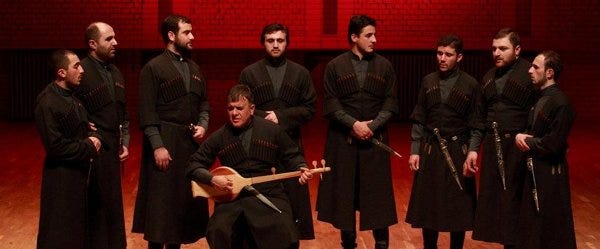The Sweetness of Harmony
Ensemble Sakhioba and Princeton University Georgian
Performing various arrangements
Nov. 12 at the Princeton University Chapel

Sakhioba (or “sweet singing” in Georgian) is an all-male singing ensemble from Tbilisi, Georgia. Prior to attending their performance, I had no idea what Georgian music even was, much less that it existed. After attending their performance, I still can’t quite vocalize what Georgian music is, but I know it relies heavily on harmonies, movement, and clapping to create a sonorous, lively effect.
The event began with three short pieces sung by the Princeton University Georgian Choirs, none of the titles of which I can pronounce. But such is the beauty of music — you don’t need to understand the name or the lyrics to get a feel for the emotions of the piece. The first song, Harira, was a wedding song mostly characterized by a series of harmonizations that gradually increased in volume and tempo. The singers introduced clapping towards the end of the piece, but unfortunately, the asynchronous noise this created served only to distract the listener from the actual singing. Soloists couldn’t quite manage to project their sound in a way that covered the vacuums of silence left behind by group parts. Nonetheless, the harmonies were in-tune and the overall sound well-balanced, with both the low and high parts coming through clearly. The Princeton University Georgian Choirs, which I assume to be rather unknown on campus, have much to offer in the way of singing.
When Sakhioba took the stage, it became very evident that they were a group composed of powerful male voices. Their soloists stood out easily from the rest of the singers, and the lively drumming had the audience quickly tapping their feet. Perkhuli, a collection of dance songs, showcased the top voice ranges, while Tsina Saukuneta focused heavily on the rich, quality of the bass voices in the group. By far the most impressive piece was Ra Lamazia Tusheti, when the lower voices of the group sustained a single note for so long and with so much resonance that it actually seemed as though they had become a stringed instrument. It was pretty trippy.
Sakhioba was a delight to listen to, but their music, at times, did verge on the repetitive. There’s only so much harmonizing one can take before every song starts sounding the same. Oddly enough, the best pieces were the ones that didn’t deal with romance or love or longing. No, the best pieces were the dancing ones, when the singers linked arms and swung one another in circles to the steady beats of the doli, the Georgian drum.